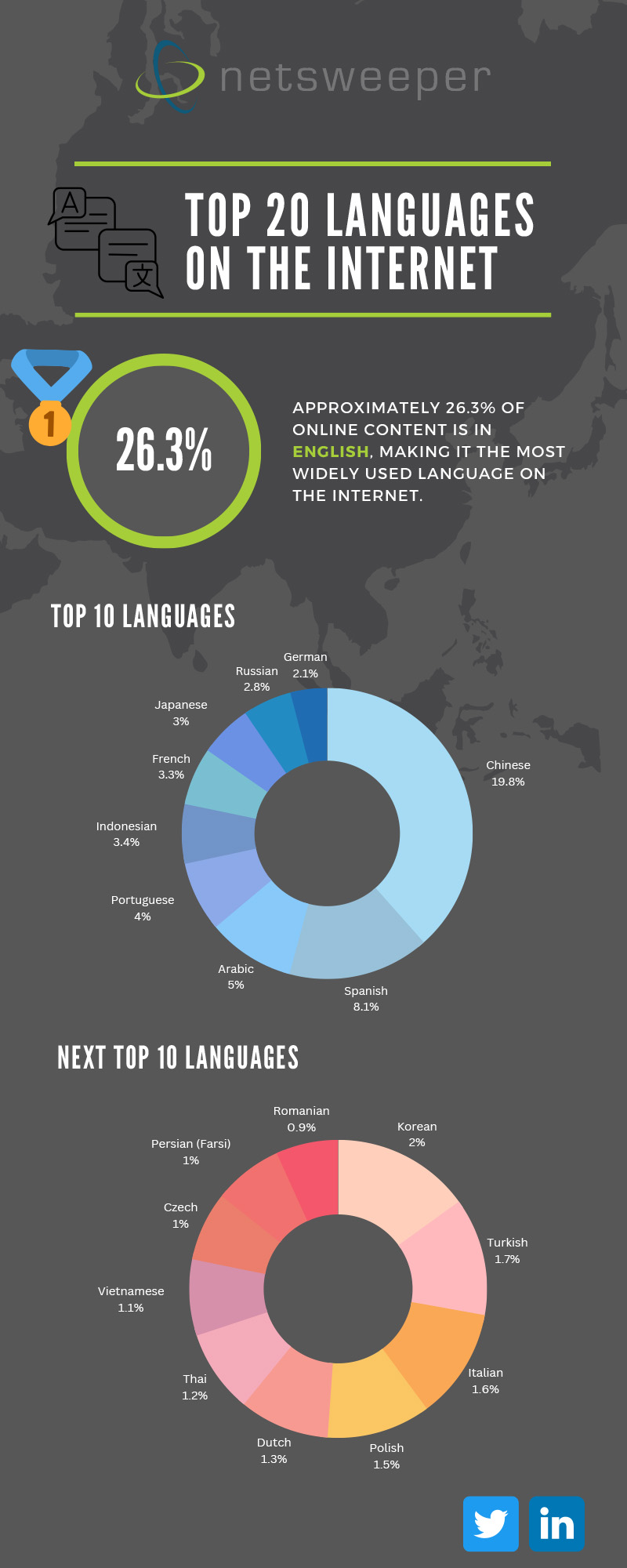In today’s interconnected world, the internet has become a global platform where people from diverse backgrounds communicate, share information, and conduct business. As a result, various languages have emerged as prominent players on the internet. Let’s delve into the top languages commonly used on the internet and explore their significance in the digital landscape.
- English: Undoubtedly, English takes the lead as the most widely used language on the internet. Its dominance can be attributed to the historical influence of English-speaking countries, technological advancements, and the widespread use of English in business and academia. English opens up a vast realm of opportunities for individuals to access information, engage in global discussions, and connect with people worldwide.
- Chinese (Mandarin): With a significant online population, China’s influence on the internet cannot be ignored. Mandarin Chinese, being the most spoken language globally, plays a vital role in shaping the online landscape. Chinese websites, social media platforms, and e-commerce platforms cater to the immense domestic market, contributing to Mandarin’s prominence on the internet.
- Spanish: As one of the most widely spoken languages, Spanish holds substantial influence on the internet. With a significant presence in Europe, Latin America, and the United States, Spanish-speaking communities actively contribute to the growth of Spanish content online. The popularity of Spanish-language media, forums, and blogs has created a vibrant online Spanish-speaking community.
- Arabic: Arabic, a language spoken by millions across the Middle East and North Africa, has gained significant prominence on the internet. Islamic culture, business opportunities, and a growing young population contribute to the Arabic language’s increasing presence online. Arabic websites, news portals, and social media platforms cater to the needs and interests of Arabic-speaking users.
- Portuguese: Portuguese, primarily spoken in Portugal and Brazil, has a strong online presence. Brazil’s rapidly growing internet user base and its vibrant digital culture have led to the proliferation of Portuguese content on the internet. Portuguese-language websites, blogs, and social media platforms cater to the Portuguese-speaking population worldwide.
- Indonesian: Indonesian, the official language of Indonesia, is another language making its mark on the internet. The country’s large population, combined with the growing internet penetration rate, has contributed to the rise of Indonesian-language content. Indonesian websites, forums, and online communities foster engagement and knowledge-sharing in the local language.
- French: French, known for its cultural significance and widespread use in various parts of the world, continues to have a strong presence on the internet. French-speaking communities, especially in France, Canada, and parts of Africa, actively contribute to the French-language content ecosystem. French websites, blogs, and social media platforms cater to the diverse interests of French speakers.
- Japanese: Japan’s technological advancements and vibrant online culture have propelled Japanese as a prominent language on the internet. Japanese-language websites, online forums, and social media platforms cater to the unique interests and preferences of Japanese-speaking users. Additionally, the popularity of Japanese media and entertainment contributes to the language’s online presence.
- Russian: Russian, widely spoken in Russia and other parts of the former Soviet Union, plays a significant role in the online world. Russian-language websites, news portals, and social media platforms facilitate communication and information exchange for Russian-speaking users. Russia’s strong digital infrastructure and the popularity of Russian-language content contribute to the language’s online presence.
- German: Germany’s economic prowess and technological advancements have propelled German as a language of significance on the internet. German-speaking communities actively engage in online activities, including blogging, e-commerce, and social media interactions. German-language websites and forums foster a sense of community and enable knowledge sharing in the German-speaking world.

The Importance of Netsweeper’s Filtering Capabilities
Netsweeper’s nFilter solution has multilingual content filtering capabilities play a crucial role in creating a safe and productive online environment for organizations. By offering detection and filtering for top languages like English, French, Spanish, Arabic, and others, Netsweeper enables compliance, productivity, and protection across diverse linguistic contexts. Organizations can leverage these capabilities to enforce policies, mitigate online threats, maintain cultural sensitivity, and enhance their overall internet security posture.
Localized in 47 languages, and with over 90 filtering categories, Netsweeper has accrued and strategically categorized 12 billion URLs to date and receive requests for over 50 million new URLs each day.
The internet serves as a powerful tool for connecting people globally, transcending linguistic barriers. While English remains the dominant language online, numerous other languages have emerged as influential players in the digital landscape. Languages like Chinese, Spanish, Arabic, Portuguese, Indonesian, French, Japanese, Russian, and German have their unique contributions, fostering online communities, facilitating communication, and enabling knowledge exchange. Embracing linguistic diversity on the internet enriches our digital experiences and promotes global understanding in an increasingly interconnected world.
